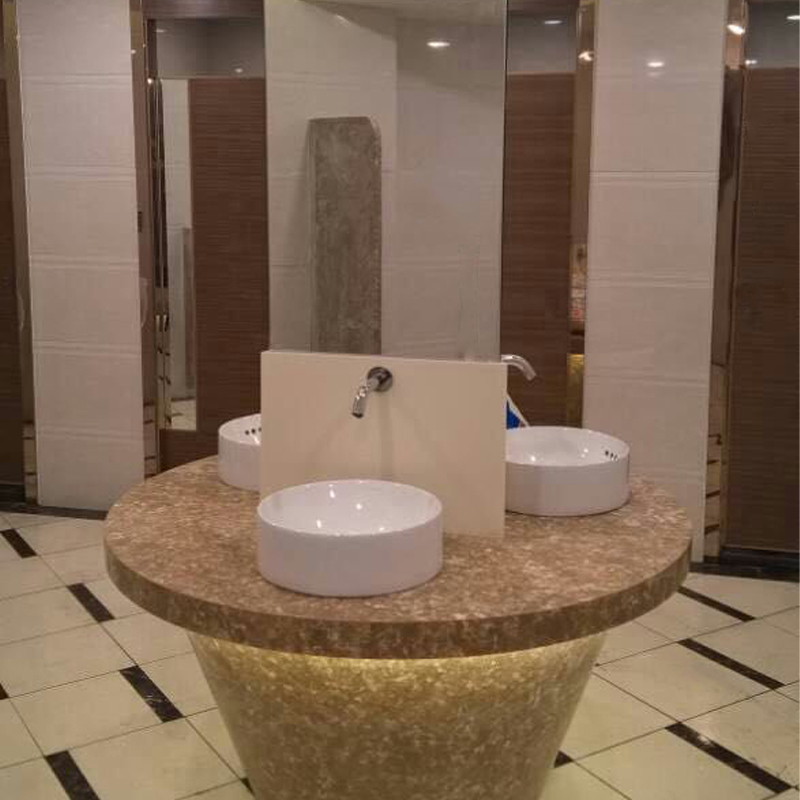
Cultured marble is a man-made composite material composed of 75-80% crushed natural marble mixed with 20-25% polyester resin as a binding agent, with added pigments for coloration. The mixture is cast into molds and polished to create sinks with the aesthetic appeal of natural stone but with enhanced durability and uniformity. The surface is typically coated with a gelcoat finish (0.5-1.2mm thick) that provides stain resistance and a glossy appearance.
Key Manufacturing Data: The production process involves vibration compaction at 50-100 Hz to eliminate air bubbles, followed by curing at 60-80°C (140-176°F) for 2-4 hours. The resulting material has a density of 2.3-2.5 g/cm³, comparable to natural marble.

Cultured marble sinks demonstrate exceptional impact resistance, with a flexural strength of 15-25 MPa and compressive strength of 80-100 MPa. The material's Mohs hardness rating of 3-4 makes it resistant to everyday wear while maintaining workability. Laboratory tests show these sinks can withstand thermal shocks up to 120°C (248°F) differential without cracking.
The gelcoat finish creates a surface with water absorption rate below 0.1%, significantly lower than natural marble's 0.5-1% absorption. This hydrophobic property is achieved through surface tension of 30-35 dynes/cm, preventing liquid penetration that could cause staining or bacterial growth (tests show 99.9% reduction in bacterial adhesion compared to porous surfaces).
Unlike natural stone, cultured marble offers ΔE color variation of less than 1.0 across production batches, measured by spectrophotometric analysis. The pigments are dispersed uniformly at 0.5-3% concentration by weight, ensuring identical hue matching for replacement or additional fixtures.
With an average weight of 12-18 kg (26-40 lbs) for a standard basin (compared to 25-35 kg/55-77 lbs for natural stone), cultured marble reduces structural load requirements by 30-45%. This makes it suitable for installations where natural stone would require additional support.
The material exhibits a thermal conductivity of 1.5-2.0 W/m·K, retaining warmth 20% longer than porcelain or ceramic. Its coefficient of thermal expansion is 25-35 x 10⁻⁶/°C, providing dimensional stability across temperature ranges encountered in bathroom environments.
Master Bathrooms: Ideal for vanity installations with 600-900mm (24-36") countertop spans, supporting 50-75kg (110-165 lbs) point loads
Powder Rooms: Small-footprint sinks (as compact as 400x400mm/16x16") maintain elegance in limited spaces
Kitchen Prep Sinks: Withstands pH ranges of 2-12 for occasional food preparation use
Hotel Guest Bathrooms: The 500-1000 scrub cycles resistance meets commercial cleaning demands
Medical Facilities: Non-porous surface meets ANSI/NSF 2 standards for healthcare environments
Senior Living: Rounded edges (minimum 3mm radius) reduce injury risks while maintaining ADA compliance
Outdoor Kitchens: UV-stabilized formulations maintain color for 10+ years with 5000+ hours xenon arc weathering resistance
Marine Applications: Saltwater-resistant versions with chloride ion penetration below 1000 coulombs
Historic Renovations: Can be cast to replicate period-appropriate designs within ±1.5mm dimensional tolerance
Use pH-neutral cleaners (6.5-7.5 pH) with soft cloths (microfiber with <150 GSM weight)
Wipe with 40-50°C (104-122°F) water to dissolve soap residues without damaging gelcoat
Immediately dry with 100% cotton towels to prevent water spotting
For mineral deposits: Apply 10% white vinegar solution for ≤5 minutes before rinsing
Organic stains: Use 3% hydrogen peroxide with baking soda paste (1:2 ratio), scrub gently with <1000 grit pads
Never use abrasive cleaners exceeding 1.5 μm Ra surface roughness
Apply carnauba-based wax (5-10% concentration) every 6-8 months to maintain hydrophobic properties
Inspect sealant joints (silicone with 50-70 Shore A hardness) annually, replacing if shrinkage exceeds 15%
Use rubber matting (60-70 durometer) under heavy objects to prevent surface abrasion
Check mounting hardware torque (2.5-3.5 Nm) annually to prevent stress fractures
Monitor for hairline cracks (>0.1mm width) using 10x magnification
Professional refinishing recommended every 7-10 years to restore gelcoat (0.2-0.3mm removal per polishing)
Professional Tip: For optimal longevity, maintain ambient humidity below 70% RH and avoid direct exposure to heat sources exceeding 80°C (176°F). These conditions prevent resin matrix degradation that could reduce the material's 50+ year theoretical lifespan by up to 40%.